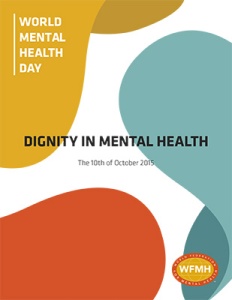October 10th is the 23rd World Mental Health Day hosted
by the World Federation for Mental Health.
Mental health is a key determinant of our wellbeing, from adult mental health and employment, child mental health, dementia to the promotion of mental health.
The wellbeing research and data give a good indication of where we can make a difference if we are serious about improving our wellbeing. Enhancing wellbeing is a key intermediate outcome in a preventative approach to policy and leads to other positive outcomes.
From the research and data we can formulate our priorities for improving wellbeing:
→The theme of this years WMHD is Dignity in Mental Health.
“Dignity” is a word that has a number of meanings, none of them precise—but we all recognize dignity when we see it, and more importantly, we recognize the lack of it when it’s absent
→ You can support on Facebook and Twitter and also join Thunderclap to donate your status update on October 10 using #WMHD
